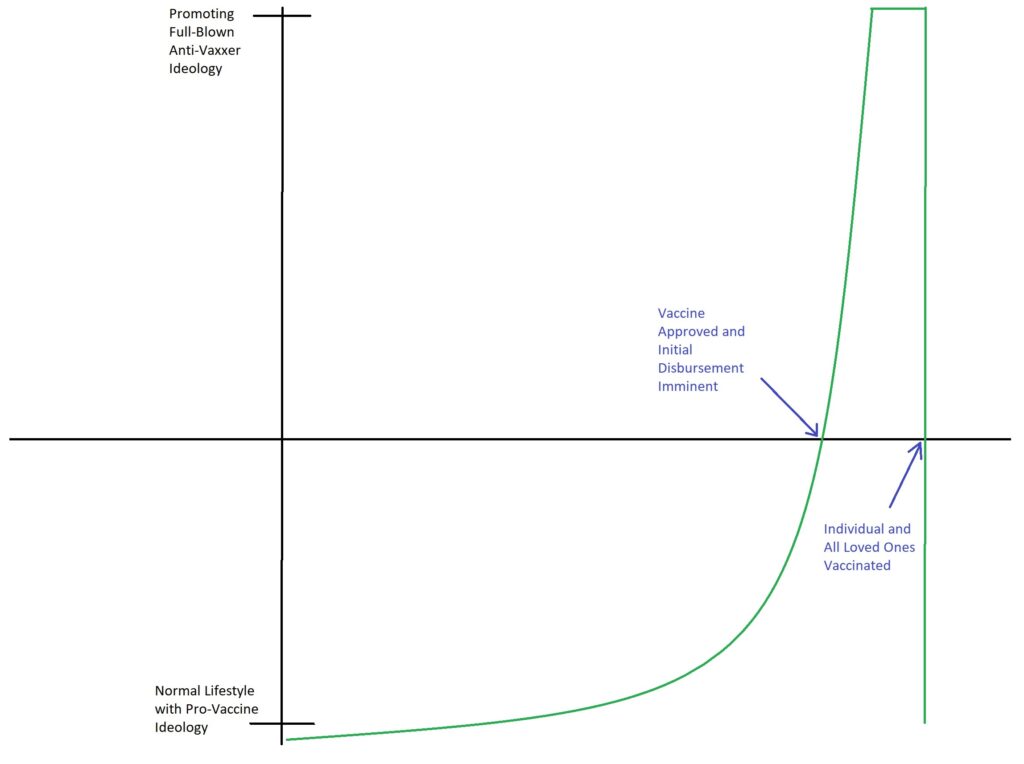Very-Low-Brow Game Theory
or… Useless Information: How And When Anti-Vaxxers Are Right
COVID-19 has made a huge impact on the world and the United States, and so-called “Anti-Vaxxers” have been an integral part of the story.
As far as I can tell, Anti-Vaxxers could only be correct in two scenarios:
1.) A world dystopian enough that the government would supply toxic vaccines – either through malice, ignorance, or incompetence. I think it’s premature to adopt that worldview currently, so I don’t subscribe to it, but I don’t discount the possibility that it could be correct in some possible dystopian future.
2.) If various Eastern religions tell us that each individual has their own truth, then game theory is the mathematical accounting of that idea. A unique scenario is actually arising in about 6 months or so, where, if an individual happened to view life as an amoral, zero-sum application of game theory, then for a brief moment in time, non-Anti-Vaxxers would have an incentive to secretly promote Anti-Vaxxer philosophy so as to increase the likelihood that they and their loved ones would receive a vaccine and could then get on with their lives (at least to some extent as compared to the present).
It’s strangely whimsical and hard boiled at the same time, but mathematically it seems to be correct.
First, it would probably have to be done secretly. Otherwise there could be a stigmatic cost to the particular individual, and that could outweigh the benefits.
Second, people are very polarized on this, and their minds are fairly made up, but in general I suspect people who believe in vaccines believe in them in an almost irreversible manner. Thus, only the “marginal Anti-Vaxxer” would probably be in play. The idea would be that some Anti-Vaxxers might be suffering from FUD (fear, uncertainty, and doubt) due to constant COVID-19 headlines, and the idea would be to undo all of that. Furthermore, a marginal Anti-Vaxxer can get a vaccine, and then lie to everyone and claim they never received one – this may be tempting.
Third, this is all predicated on the idea that vaccines will be limited at first. Most people believe that will be the case.
Fourth, it goes without saying that there is a social cost to millions of people not getting vaccinated, and then risking death or taking up hospital resources. That cost then trickles down to the individual, so after the individual (and their loved ones) are vaccinated, they no longer have any incentive to spread propaganda.
(For the purposes of this analysis, “loved ones” would include anyone in the individual’s life who the individual has a significant personal stake in remaining healthy.)
Fifth, there’s no question that the impact of the individual’s propaganda effort is small, so it’s assumed that the individual has nothing better to do. Given the unemployment numbers, and what many people are reported to be doing currently, it could be argued that that’s the case. (That I would ever write a blog post this useless, and that you would read it, could also be supportive of that idea.) Each individual will vary, and if there were something more enriching that the individual were likely to do, then the model doesn’t hold for that individual.
Sixth, would it make sense to go full-blown Anti-Vaxxer during the entire crisis? Not necessarily. The problem is that it’s not known when a vaccine will become available! Thus, if it keeps getting delayed, the cost of doing this could become exorbitant. However, this is sort of an open question with an amorphous shape, since the individual may not be spending his time on something more useful anyway.
Thus, the chart would look something like this:
To be completely honest – and this is likely the only real value in the above analysis – I think people acting on the above whimsical idea could be a fairly interesting concept for some sort of comedy some day, although not necessarily specific to COVID-19. COVID-19 carries too much negative baggage due to the tragedy and trauma it’s already caused.
So would I partake in something like this? Nope, not at all. First, it’s just too reprehensible. (Moral concerns are generally incompatible with the tenets of game theory; only people who truly don’t care can succeed in such a model). But second, if I were being completely honest, another reason is that these mathematical benefits are too small to see. The larger and more pronounced the benefits – for example, the certainty between life and death – the more likely the individual will be tempted, if not compelled, to act.
